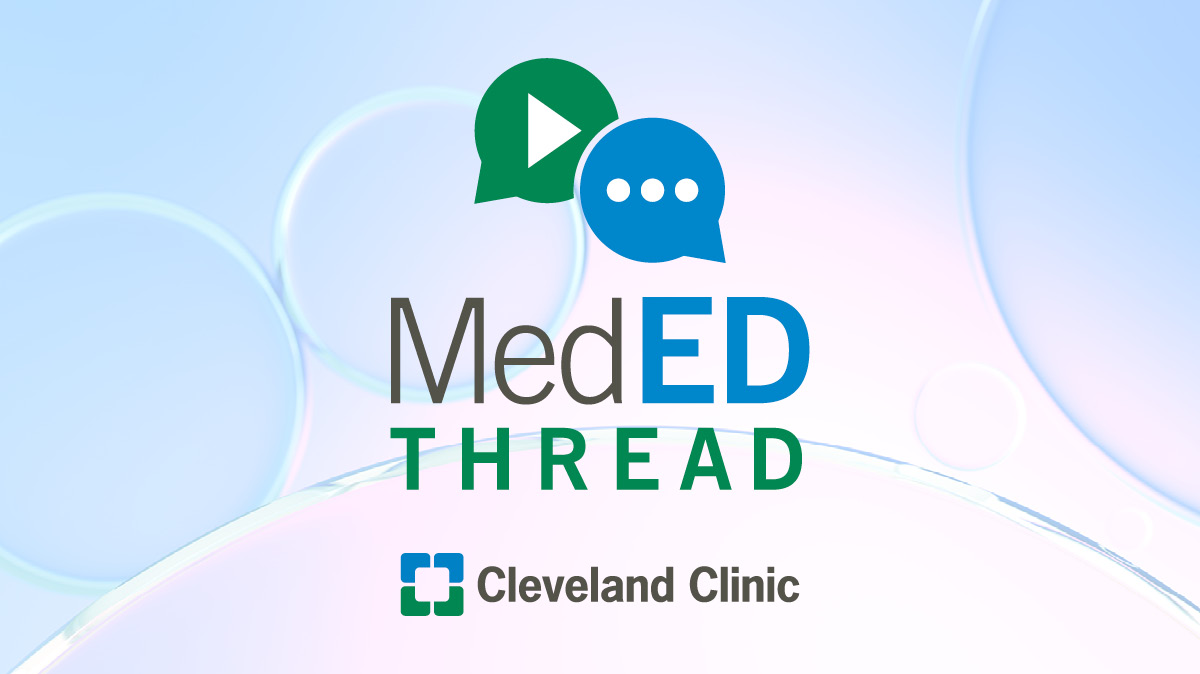
MedEd Thread
Subscribe:

Featured Episode
AI in Medical Education: Personalizing Learning and Supporting the Next Generation of Clinicians
In this episode of MedEd Thread, we talk with Dr. Rick Rejeleene, Special Fellow for Artificial Intelligence and Education at Cleveland Clinic, about how AI is enhancing medical education through personalized learning, virtual patient simulations, automated assessment and streamlined administrative support. Dr. Rejeleene discusses the benefits these tools bring to both learners and faculty, the risks of cognitive de-skilling and the importance of thoughtful, human-centered integration. He also highlights current projects using AI to improve reflective writing feedback and communication practice, offering insight into how educators can responsibly leverage AI to better prepare future clinicians. Tune in to learn how AI can elevate training and better prepare the next generation of clinicians.
Play NowAll MedEd Thread Episodes
February 4, 2026
Working With Gen Z Colleagues
In this episode of MedEd Thread, we talk with Brian Polian, Vice President for Athletics and National Engagement at John Carroll University and a veteran collegiate football coach, about working effectively with Generation Z learners. Drawing on decades of leadership and coaching experience, Brian explores the defining characteristics of Gen Z, common misconceptions and how relationships, authenticity and psychological safety shape learning and performance. He shares practical strategies for communication, feedback and leadership adaptation, along with lessons from the COVID-19 era and insights on motivating, supporting and developing young professionals. Tune in to learn how educators and leaders can better connect with Gen Z and create environments where today’s learners can thrive.
Play NowJanuary 21, 2026
Addressing Mistreatment in Medical Training: Creating Safer Learning Environments
In this episode of MedEd Thread, we talk with Dr. Stacey Algren, Associate Dean of Student Learning Environment at the University of Missouri Kansas City School of Medicine, and Dr. Tim Lacy, Director of Student Learning Environment at the University of Illinois College of Medicine, about the persistent challenge of medical student mistreatment in academic medicine. Dr. Algren and Dr. Lacy share national trends, institutional experiences and the nuanced ways mistreatment can manifest. They discuss why reporting remains essential, how psychological safety influences learning and performance and what institutions can do to create a healthier culture for trainees. Tune in to learn how coordinated efforts, open communication and student centered initiatives can strengthen the learning environment and support the next generation of physicians.
Play NowJanuary 7, 2026
Transforming Conflict: Building Stronger Teams Through Perspective and Dialogue
In this episode of MedEd Thread, we talk with Rachel King, J.D., Cleveland Clinic’s Director for Educational Integrity and Assistant Dean of Students for the School of Health Professions, about how conflict transformation can turn workplace tension into an opportunity for growth. Rachel shares why addressing conflict isn’t just about resolution—it’s about reshaping relationships, fostering understanding, and creating healthier team dynamics. They discuss the difference between resolution and transformation, how restorative practices and perspective-taking can reset strained interactions and why these skills are essential for leaders and educators. Tune in to learn how intentional strategies can make conflict a productive tool for collaboration and long term success.
Play NowDecember 24, 2025
Recognizing and Countering Anti-Fat Bias in Healthcare
In this episode of MedEd Thread, we talk with Dr. Alison Reiheld, Professor of Philosophy and medical ethicist at Southern Illinois University, Edwardsville, about how anti-fat bias impacts patient care and clinical decision-making. Dr. Reiheld shares why assumptions about body size can lead to delayed treatment, missed diagnoses and diminished trust—and offers strategies to counter these biases through patient-centered communication and systemic change. They discuss why conditioning care on weight loss is ethically problematic, how common scripts perpetuate stereotypes and what clinicians can do to ensure fat patients receive care in the bodies they have. Tune in for a thought-provoking conversation that challenges assumptions and highlights steps toward more equitable healthcare.
Play Now


